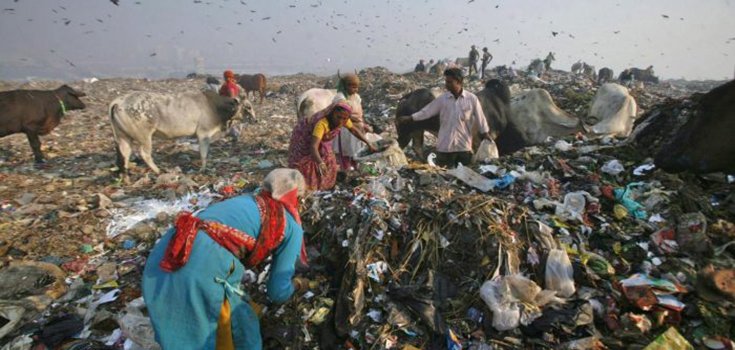Delhi Government Passes a Disposable Plastics Ban for the 2nd Time

In December 2016, the National Green Tribunal (NGT) in Delhi, India, voted to pass a law banning the use of all disposable plastics throughout the capital region, including bags, chai cups, and cutlery. The ban went into effect January 1, 2017. [1]
Massive amounts of plastic waste are generated by India, and environmentalists are cheering the move. However, fruit and vegetable vendors are concerned the ban will hurt business by driving customers to shop where they can get a bag to carry their purchases.
The alternatives to plastic – paper and cloth – can be a financial hardship for both shoppers and shop owners in India. A plastic bag costs around 3 or 4 rupees, whereas a cloth bag costs about 15 rupees. [1] [2]
But India is one of the top polluters in the world, responsible for roughly 60% of the 8.8 tons of plastic that are dumped into the world’s oceans each year. If that momentum goes unchecked, Asia will be dumping 80% of the world’s plastic at a rate of 200 tons a year by 2025. [1]
Delhi’s ban is partly a reaction to 3 local dumping sites – Okhla, Gazipur, and Bhalswa. These facilities operate as waste-to-energy plants, but locals claim they use illegal mass burning technology that sends pollutants spewing into the air. What isn’t burned up clogs the Yamuna, the second largest tributary river of the Ganges. [1] [2]
Read: Will There be More Plastic Than Fish in the Ocean by 2050?

The tribunal said in a statement:
“Each of these sites is a depiction of the mess that can be created for the environment and health of people of Delhi. We direct that use of disposable plastic is prohibited in entire NCT [National Capital Territory] of Delhi.
The Delhi government shall take steps for storage and use of plastic materials. All the corporations … and other public authorities, including NCT of Delhi, are directed to take immediate steps for reduction and utilization of dumped waste.” [3]
Waste-to-energy plants that fail to comply with the new the rules will be fined about $7,300 for each “pollution incident” which, unfortunately, is barely a slap on the wrist. Street vendors and slaughterhouses that dispose of trash in public places will receive a fine of $150 for each incident. [2]
China’s air pollution is in the news on a regular basis these days, but not much is said about India. How bad is it?
In November 2016, U.K. Prime Minister Theresa May visited India for 3 days, becoming exposed to air that was 36 times more toxic than in London. Following her visit, analysts commissioned by Greenpeace calculated that the air pollution was so bad during those 3 days that it had probably slightly shortened May’s lifespan. [3]
Read: Toxic Nanoparticle Air Pollution Found in Human Brain Tissue
The Delhi government has tried banning plastic in the past. In 2009, it banned plastic bags in hotels, hospitals, shopping malls, major markets, greengrocers, and others areas. The ban was effective at first, but it didn’t last long. [2]
Sources:
[1] Treehugger
[2] Co.exist
[3] Independent (Featured image source)
